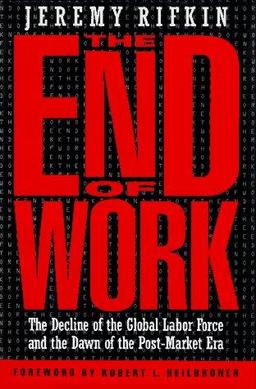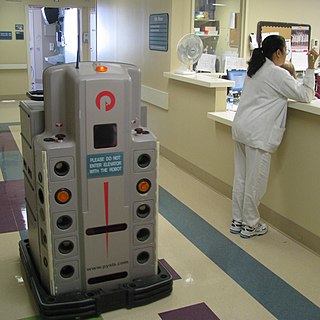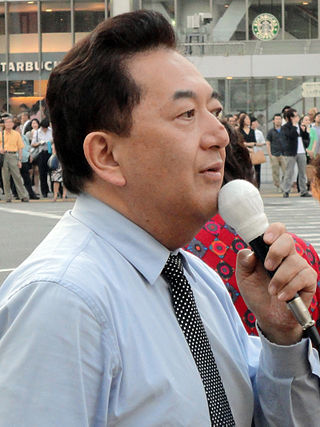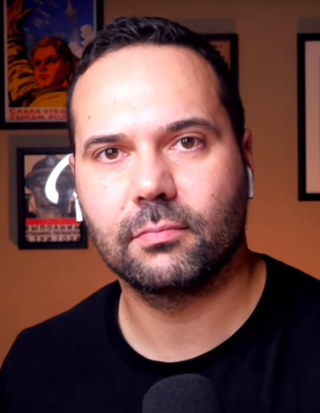
Citizen's dividend is a proposed policy based upon the Georgist principle that the natural world is the common property of all people. It is proposed that all citizens receive regular payments (dividends) from revenue raised by leasing or taxing the monopoly of valuable land and other natural resources.

Automation describes a wide range of technologies that reduce human intervention in processes, namely by predetermining decision criteria, subprocess relationships, and related actions, as well as embodying those predeterminations in machines. Automation has been achieved by various means including mechanical, hydraulic, pneumatic, electrical, electronic devices, and computers, usually in combination. Complicated systems, such as modern factories, airplanes, and ships typically use combinations of all of these techniques. The benefit of automation includes labor savings, reducing waste, savings in electricity costs, savings in material costs, and improvements to quality, accuracy, and precision.

Andrew L. Stern is the former president of the Service Employees International Union, and now serves as its President Emeritus.

The End of Work: The Decline of the Global Labor Force and the Dawn of the Post-Market Era is a non-fiction book by American economist Jeremy Rifkin, published in 1995 by Putnam Publishing Group.

Universal basic income (UBI) is a social welfare proposal in which all citizens of a given population regularly receive a guaranteed income in the form of an unconditional transfer payment. It would be received independently of any other income. If the level is sufficient to meet a person's basic needs, it is sometimes called a full basic income; if it is less than that amount, it may be called a partial basic income. No country has yet introduced either, although there have been numerous pilot projects and the idea is discussed in many countries. Some have labelled UBI as utopian due to its historical origin.

Technological unemployment is the loss of jobs caused by technological change. It is a key type of structural unemployment.
Universal basic income in India refers to the debate and practical experiments with universal basic income (UBI) in India. The greatest impetus has come from the 40-page chapter on UBI that the Economic Survey of India published in January 2017. It outlined the 3 themes of a proposed UBI programme:
Universal basic income is a subject of much interest in the United Kingdom. There is a long history of discussion yet it has not been implemented to date. Interest in and support for universal basic income has increased substantially amongst the public and politicians in recent years.

Universal basic income refers to a social welfare system where all citizens or residents of a country receive an unconditional lump sum income, meaning an income that is not based on need. The proposal has been debated in a number of countries in recent years, including Japan..

Martin Ford is a futurist and author focusing on artificial intelligence and robotics, and the impact of these technologies on the job market, economy and society.
Universal basic income has been debated in the Nordic countries since the 1970s. It has mostly been seen as a radical and utopian proposal and not taken seriously by the big political parties. However, 1 January 2017 to 1 January 2019 Finland conducted a basic income pilot which got international attention. There are also some political parties and some politicians and journalists in all Nordic countries who are pushing for the idea of a guaranteed income. The Green parties for example, are generally interested in universal basic income, as well as the Pirate parties.
Universal basic income (UBI) is discussed in many countries. This article summarizes the national and regional debates, where it takes place, and is a complement to the main article on the subject: universal basic income.
Universal basic income pilots are smaller-scale preliminary experiments which are carried out on selected members of the relevant population to assess the feasibility, costs and effects of the full-scale implementation of universal basic income, or the related concept of negative income tax, including partial universal basic income and similar programs. The following list provides an overview of the most famous universal basic income pilots, including projects which have not been launched yet but have been already approved by the respective political bodies or for the negotiations are in process.

Andrew Yang is an American businessman, attorney, lobbyist, and politician. Yang was a candidate in the 2020 Democratic Party presidential primaries and the 2021 New York City Democratic mayoral primary. He is the co-chair of the Forward Party, alongside former New Jersey Governor Christine Todd Whitman.
A robot tax is a legislative strategy to disincentivize the replacement of workers by machines and bolster the social safety net for those who are displaced. While the automation of manual labour has been contemplated since before the industrial revolution, the issue has received increased discussion in the 21st century due to newer developments such as machine learning.
Universal basic income and negative income tax, which is a related system, has been debated in the United States since the 1960s, and to a smaller extent also before that. During the 1960s and 1970s a number of experiments with negative income tax were conducted in United States and Canada. In the 1970s another and somewhat related welfare system was introduced instead, the Earned Income Tax Credit. The next big development in the history of basic income in the United States came in 1982, when the Alaska Permanent Fund was established. It has delivered some kind of basic income, financed from the state's oil and gas revenues, ever since.
The 2020 presidential campaign of Andrew Yang, an attorney, entrepreneur, and the founder of Venture for America, began on November 6, 2017, when Yang filed with the Federal Election Commission to participate in the Democratic primaries. Yang suspended his campaign on February 11, 2020, the night of the New Hampshire primary. On March 10, 2020, Yang endorsed Joe Biden for president.
A wage subsidy is a payment to workers by the state, made either directly or through their employers. Its purposes are to redistribute income and to obviate the welfare trap attributed to other forms of relief, thereby reducing unemployment. It is most naturally implemented as a modification to the income tax system.

Aaron Bastani is a British journalist and writer. He co-founded the left-wing media organisation Novara Media in 2011, and has hosted and co-hosted many of its podcasts and videos. After a 2014 video for the publication, he popularised the term "fully automated luxury communism", which describes a post-capitalist society in which automation greatly reduces the amount of labour humans need to do. He wrote a book in 2019, Fully Automated Luxury Communism, about the subject. Bastani has also written for The Guardian, London Review of Books, openDemocracy and Vice, and is known for his Twitter activity.










